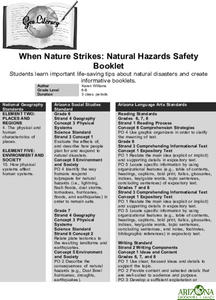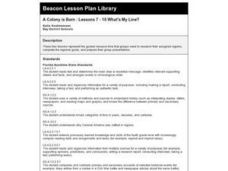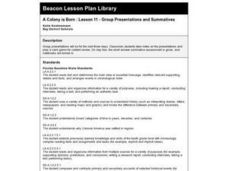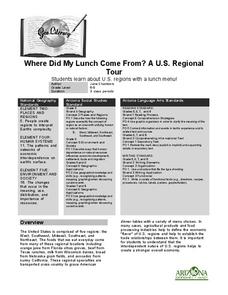PBS
Explicit and Implicit Language – Interpreting the Meaning of the Fourteenth Amendment
How do Supreme Court justices interpret amendments to the Constitution? The resource helps answer that question by discussing how people use explicit and implicit language to interpret the meaning of the Fourteenth Amendment. Learners...
Anti-Defamation League
Implicit Bias
Everyone has biases, both explicit—ones we are aware of—and implicit—ones we are unaware of. High schoolers learn the differences between explicit and implicit bias in a short lesson where pupils watch a short video, read articles about...
Federal Reserve Bank
The Legacy of the Olympics: Economic Burden or Boon?
Do the economic benefits of major sporting events such as the Olympics or the World Cup outweigh the expected costs? Using fundamental economic terms, discover the explicit and implicit costs and benefits for countries that host these...
Curated OER
Explicit and Implicit Language - Interpreting the Meaning of the Fourteenth Amendment
Young scholars write an essay analyzing the language of the Fourteenth Amendment to the US Constitution. In this US History lesson, students review the difference between implicit and explicit meanings. Young scholars watch a...
Curated OER
Lesson 4: Fact and Opinion - Rosa Parks: My Story
Sixth graders examine implicit and explicit opinions in a text about Rosa Parks. In this explicit and implicit opinions lesson plan, 6th graders participate in direct teaching, guided practice, and independent practice while reading an...
PBS
Ken Burns: Jackie Robinson - A Journey Back to Separate but Equal Conditions
Baseball great Jackie Robinson fought for social justice. His efforts to push for equal access are detailed in an episode from from the Ken Burns: The Jackie Robinson Collection. After viewing the clip, class members engage in a...
Mikva Challenge
Deconstructing Campaign Messages and Perceptions
Target audience, covert message, explicit and implicit appeals. As part of an investigation of rhetorical devices used in campaign ads, class members examine and deconstruct the appeals in logos from...
National History Day
Propaganda Posters of World War I: Analyzing the Methods Behind the Images
The power of a picture. During the events surrounding World War I, propaganda posters were widely distributed in American society to sway the emotions of its citizens. By analyzing World War I propaganda posters in the first installment...
Curated OER
Cultural Values Messages in the Giant Kites of Guatemala
Pupils describes ways in which the arts serve as expressions of culture. They explain how some forms of cultural communication contributes to societal cohesion and/or division. Students detect and analyze explicit and implicit messages...
Curated OER
When Nature Strikes: Natural Hazards Safety
Students observe the impact of natural disasters on humans, and become aware of the dangers of environmental hazards such as flash floods, tornadoes, and hurricanes.
Facing History and Ourselves
The Nazis in Power: Propaganda and Conformity
The Nazis used the power of propaganda to encourage confirmative views and the discrimination of Jews. A social studies resource illustrates these issues through discussion, image analysis, and a writing exercise.
Facing History and Ourselves
Confirmation and Other Biases
As the investigation into the reporting of the events in Ferguson, Missouri, continues, class members consider how bias influences perception, how the tendency is to collect evidence that supports preconceived notions. The big idea...
Curated OER
A Colony is Born : Lesson 6 -To Leave or Not to Leave
Fifth graders connect reasons for coming to the New World with identity. The create identities and place them in one of three settled regions. They refer to prior study notes in their Colonial Notebooks to establish their identities.
Curated OER
A Colony is Born : Lessons 7 - 10 What's My Line?
Fifth graders research their assigned regions, complete regional guide and prepare presentations about the New World colonists. They refer to "Everyday LIfe: Colonial Times" as well as searching marked internet sites.
Curated OER
A Colony is Born : Lesson 11 - Group Presentations and Summatives
Fifth graders give presentations on colonial research. The others take notes on the presentations. They play a card game which helps them review content. They take a summative assessment and present their research notebooks.
Curated OER
Women Writers and Dissent in 20th and 21st Century American Literature
Tenth graders read examples of writings by women authors showing their dissent. After completion of their reading, they brainstorm on why they believe female authors have criticized society. In groups, they use the Internet to research...
Curated OER
Too Many Tamales
Students investigate Mexican holiday celebrations and compare them to American Christmas holidays. They conduct a Mexican Christmas Scavenger Hunt. The lesson uses a streaming video in order to engage students in the main objectives.
Curated OER
Focus on the Media
Students critically examine news articles and editorials for attitudes of discrimination and prejudice. Students then complete checklist in which they analyze news reports for context, content, point of view, language, graphics, and...
Curated OER
Where Did My Lunch Come From? A U.S. Regional Tour
Students explore the regions from which their food comes. In this social studies lesson, students identify the different agricultural products that are found in the major regions of the United States. Students create a lunch menu.
Curated OER
Islamic Art
Students examine the various forms of Islamic Art. Using the art, they identify the basic elements and research its history and style of calligraphy. They create a piece of art based on information they collected and demonstrate...
Curated OER
Moral Dilemmas
In this moral dilemmas worksheet, students will cut apart 16 question cards. Then they will take turns reading scenarios about situations involving using one's morals and discuss how they would handle these situations.
Ed Change
Inclusion/Exclusion
Students verbally share their own experiences as students, exploring different ways people are made to feel "included" in the learning process.
Curated OER
History/Mystery: Regionalism and Ethnicity in the American Detective Novel
Students use mystery novels to focus on the history and ethnicity of different regions of the United States. As a class, they are introduced to the elements of a mystery and compare them to the other types of novels they have read. In...
Curated OER
Inventions and Inventors
Fifth graders investigate an introduction to both Invention Convention and Unit 3 in the Social Studies Book, the teacher will point out that many changes occurred in the United States during the late 1800s and early 1900s.¿¿¿...
Other popular searches
- Implicit and Explicit Meaning
- Implicit Explicit
- Implicit and Explicit Facts
- Implicit and Explicit
- Explicit and Implicit Theme
- Implicit Explicit Facts























